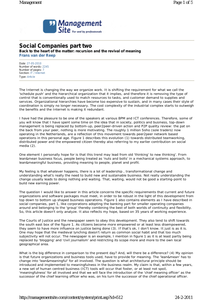In dit magazine (rapport) blikken betrokken onderzoekers en professionals terug op “The Next Level” en de resultaten daarvan, die onder meer bestaan uit trainingen op het gebied van ‘crises & social media’ voor professionals. In mei 2016 is na ruim 2 jaar een einde gekomen aan onderzoeksproject "The Next Level". De lectoraten Crossmediale communicatie in het Publieke Domein en Regie van Veiligheid (Hogeschool Utrecht) werkten hierin samen met professionals uit het communicatie- en veiligheidsdomein. Centrale vraag in dit onderzoek was: hoe kan bij een crisis - beïnvloed door sociale media - effectief vorm worden gegeven aan crisiscommunicatie en crisismanagement?
DOCUMENT

De ransomware-aanval op de Universiteit Maastricht (2019) en de wiperware-aanval op Maersk (2017) hebben pijnlijk aangetoond dat grote incidenten niet te voorkomen zijn en zelfs kunnen uitmonden in een cybercrisis. De mate waarin organisaties in staat zijn om de impact van cybercrises te beperken, wordt onder andere bepaald door de bedrijfscontinuïteit- en crisismanagement organisatie. Maar hoe richt je deze beheersmaatregelen adequaat in?
DOCUMENT

Full text via link. In mei 2016 is na ruim 2 jaar een einde gekomen aan onderzoeksproject The Next Level. De lectoraten Crossmediale Communicatie in het Publieke Domein (PubLab) en Regie van Veiligheid (Hogeschool Utrecht) werkten hierin samen met professionals uit het communicatie- en veiligheidsdomein. Centrale vraag in dit onderzoek was: hoe kan bij crisis beïnvloed door sociale media effectief vorm worden gegeven aan crisiscommunicatie en crisismanagement? In dit magazine blikken betrokken onderzoekers en professionals terug op The Next Level en de resultaten daarvan, die onder meer bestaan uit trainingen voor professionals op het gebied van crises & social media. Bijdragen van Menno van Duin, Annette Klarenbeek, Jan Eberg, Karen Hilhorst, Maartje Harmelink, Petra Sneijder en Reint Jan Renes.
DOCUMENT

In de volksmond staat het International Facility Management Programme bekend als 'Summerschool'. Het programma, waarmee acht samenwerkende opleidingen uit Duitsland, Finland, Nederland en Oostenrijk mede gestalte geven aan internationalisering, speelt zich namelijk grotendeels in de zomervakantie af. Dit jaar was het - jaarlijks wisselende, internationaal relevante - thema bedrijfscontinuïteit.
DOCUMENT

@CRISIS VIA CROSSMEDIA doet Hogeschool Utrecht onderzoek naar crisiscommunicatie en veiligheid. Het project speelt in op een sterke behoefte bij communicatie-en veiligheidsadviseurs. Namelijk: hoe kan bij crises beïnvloed door sociale media effectief vorm worden gegeven aan crisiscommunicatie en crisismanagement op basis van wetenschappelijke inzichten. Deze brochure geeft een korte weergave van de achtergrond van het onderzoek, onderzoeksmethoden, de samenwerkingspartners, het onderzoeksteam en de koppeling met het onderwijs. Aan deze brochure werkten verder mee: Marleen Haage, Karin Hilhorst, Menno van Duine en Reint Jan Renes
LINK
Crisismanagement speelt een grote rol binnen een zorginstelling. Het waarborgen van zorgcontinuïteit is hierbij van belang. Een optimaal georganiseerde crisisorganisatie is hier een onderdeel van. Livio haar crisisorganisatie is niet meer actueel. Om deze reden is er een vernieuwd crisisplan en crisisteam opgesteld naar aanleiding van onderzoeken. Om het crisisplan te kunnen implementeren en actueel te kunnen houden, is er een implementatieplan en een handleiding opgesteld, naast het vernieuwde crisisplan.
MULTIFILE
This Article presents the PSO matrix as a tool for making choices in change projects – choices for simplicity or for complexity. A good process structure is essential for a simple organization, but it is the employees and the managers who are expected to take the lead in the changes and the improvement proposals. The PSO matrix is a useful and usable instrument that promotes simplicity and respects the intelligence that is already present in the organization, particularly that of the ordinary employees. The approach leads to drastic savings. Do as much nothing as possible.
MULTIFILE

The Internet is changing the way we organize work. It is shifting the requirement for what we call the ‘schedule push’ and the hierarchical organization that it implies, and therefore it is removing the type of control that is conventionally used to match resources to tasks, and customer demand to supplies and services. Organizational hierarchies have become too expensive to sustain, and in many cases their style of coordination is simply no longer necessary. The cost complexity of the industrial complex starts to outweigh the benefits and the Internet is making it redundant.
MULTIFILE

Interview met o.a. Menno van Duin. Bij een calamiteit staat de school volkomen onverwacht volop in de belangstelling, zowel bij medewerkers, leerlingen en ouders als in de pers en op sociale media. Daar moet je als school snel en adequaat op reageren. Hoe leid je de in- en externe communicatie in goede banen?
DOCUMENT

We examine the ways in which a hidden crisis can be exposed from a communication point of view. In which way can organisations create general awareness of a crisis and try to understand the dynamic nature of interactions? With the help of discourse analysis, we have examined the interactional achievements of two crisis entrepreneurs in the domain of education in the Netherlands: a rector of a secondary school and the founders of BON, a social movement aimed at improving the quality of education. In this way, we will illustrate the discursive practices that play an active role when certain players signal a crisis.
DOCUMENT
